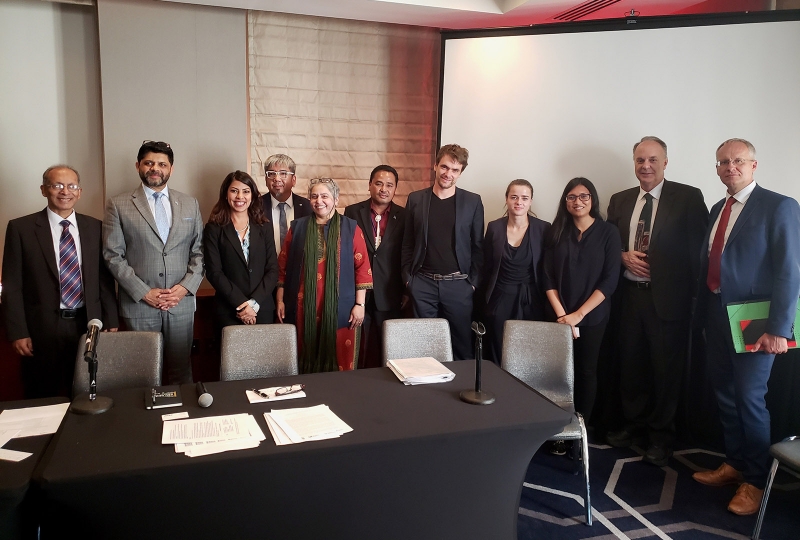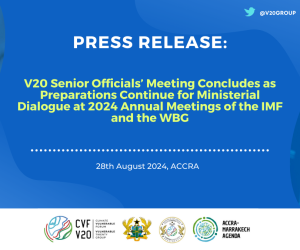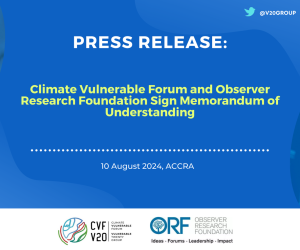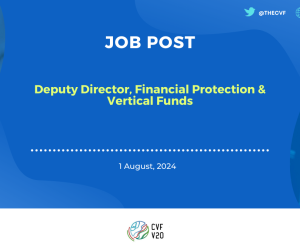Vulnerable countries to insure MSMEs amidst worsening climate disasters

MSMEs account for 29% of GDP and employ 78% of workforce in vulnerable economies
NEW YORK, 22 Sept 2019 – The Vulnerable Twenty (V20) group of economies today rolled out its Sustainable Insurance Facility (SIF) to protect micro, small and medium-sized enterprises (MSMEs) that account for 29% of GDP and employ 78% of workforce in vulnerable economies. Worsening climate disasters would further drag down economic productivity and resilience if the MSME sector does not have adequate insurance protection and investment capacity to absorb financial shocks and de-risk the low-carbon transition, according the group.
“Our vulnerabilities to climate change are a major strain on our economies. Those of us on the frontline of the climate crisis cannot afford to merely wait and watch the world breach the 1.5 tipping point,” said Honourable Minister, Attorney General Sayed-Khaiyum of the Republic of Fiji.
Bangladesh, Fiji, the Marshall Islands and the Philippines are expected to be the first to test the SIF, which is being developed in partnership with the Asian Development Bank, Munich Climate Insurance Initiative, UN Environment’s Principles for Sustainable Insurance, and the InsuResilience Funds invested in by G20 members.
“Despite their importance, MSMEs inherently face a wide spectrum of risks, many of which are commercially uninsurable. I hope we are able to garner support for the Sustainable Insurance Facility which aims to significantly increase insurance coverage for populations, livelihoods and economic assets against climate and disaster risks,” said Ywao Elanzo Jr, Assistant Secretary in the Ministry of Finance of the Republic of the Marshall Islands.
“MSMEs are at the heart of vulnerable economies and are vital to achieving sustainable development. Through the V20 Sustainable Insurance Facility, we look forward to delivering effective insurance solutions that would support the transition of vulnerable economies into climate-resilient, low-carbon and sustainable economies,” said Butch Bacani, Program Lead of UN Environment’s Principles for Sustainable Insurance (PSI).
The SIF aims to enhance socio-economic resilience through strong and consistent employment opportunities as well as social protection for the vulnerable, and strengthen national productivity by enabling better credit access and investment security.
“Needs-responsive financial protection, which supports pro-active risk management and risk reduction, in line with strong, country-led CDRFI frameworks is key to ensure sustainability in solutions,” said Soenke Kreft, Executive Director of Munich Climate Insurance Initiative.
In addition, the SIF may reduce pressure on public spending ex post disaster to maintain fiscal and financial stability by ensuring fewer implicit contingent liabilities, continued tax revenue, and fewer negative effects to GDP.
In Bangladesh, for example, climate change is expected to decrease agricultural GDP by 3.1% each year, equal to US$36 billion. The loss increases to US$129 billion in indirect impacts on complementary industries.
”It’s important to realize that Bangladesh is growing at 6.3% per year and the biggest threat to this growth is the high climate risk exposure of our populations and major economic sectors. We need to drive up investment in adaptation, enable comprehensive risk management, and access to climate and disaster risk finance and insurance,” said Shahidul Islam, Additional Secretary in the Ministry of Finance of the People’s Republic of Bangladesh.
In the last ten years, climate vulnerability had cost V20 countries an additional US$62 billion in interest payments alone, including US$40 billion in additional interest payments on government debt, according to UN Environment Program. Future interest payments due to climate vulnerability are projected to increase to US$168 billion over the next decade.
V20 economies consistently post some of the highest economic growth rates worldwide. Yet they do not rank among the countries attracting substantial investment capital. V20 countries face considerable barriers such as higher costs of capital in financing that affect both resilience and renewable energy projects, as well as huge inefficiencies when attempting to access international climate finance.
In 2018, the V20 formed an initiative with the G20 on the InsuResilience Global Partnership. They introduced the Global Risk Financing Facility (GriF) hosted in the World Bank to help vulnerable countries manage the financial impacts of climate change and natural hazard-induced shocks, and enable resilient debt management. Through highlighting the need for increased support and ambition for resilient infrastructure investments, the V20 seeks to advance the cost-effectiveness of integrated risk management and financing solutions, and to enhance coherence among the Paris Agreement, the Sendai Framework for Disaster Risk Reduction and the G20’s efforts on adaptation.
Formed in 2015, the V20 Group of Finance Ministers is a dedicated cooperation initiative of economies systemically vulnerable to climate change. It is currently chaired by the Republic of Marshall Islands. The V20 membership stands at 48 economies including Afghanistan, Bangladesh, Barbados, Bhutan, Burkina Faso, Cambodia, Colombia, Comoros, Costa Rica, Democratic Republic of the Congo, Dominican Republic, Ethiopia, Fiji, The Gambia, Ghana, Grenada, Guatemala, Haïti, Honduras, Kenya, Kiribati, Lebanon, Madagascar, Malawi, Maldives, Marshall Islands, Mongolia, Morocco, Nepal, Niger, Palau, Palestine, Papua New Guinea, Philippines, Rwanda, Saint Lucia, Samoa, Senegal, South Sudan, Sri Lanka, Sudan, Tanzania, Timor-Leste, Tunisia, Tuvalu, Vanuatu, Viet Nam and Yemen.




